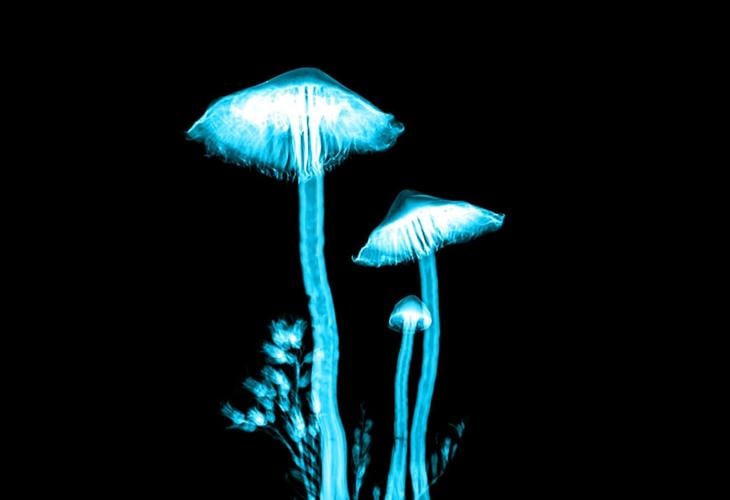
Mathew Schwartz
By Stephen Beech
Most depression patients treated with the psychedelic compound found in "magic mushrooms" are still free of symptoms five years later, according to new research.
Two-thirds of clinical trial participants treated with psilocybin-assisted therapy for major depressive disorder were in "complete remission" from their depression after five years, say American scientists.
The study involved participants from a trial published in 2021 that found psilocybin - the primary psychedelic substance in magic mushrooms - combined with psychotherapy in adults was effective at treating major depressive disorder.
An average of five years after the clinical trial, a majority of participants reported lasting depression remission as well as improvement in a range of well-being measures.
Study lead author Professor Alan Davis, from The Ohio State University, said: “We found that 67% were in remission at five years compared to 58% at one year.
"We also saw that across the board, anxiety, depression, global functioning, self-reported depression, all of these measures were showing the same signal of continued improvement up to five years later.”

(Photo by MART PRODUCTION v
Davis, who co-led the 2021 trial at Johns Hopkins University, said: “Five years later, most people continued to view this treatment as safe, meaningful, important, and something that catalysed an ongoing betterment of their life.
“It’s important for us to understand the details of what comes after treatment.
"I think this is a sign that regardless of what the outcomes are, their lives were improved because they participated in something like this.”
In the original trial, two participant groups – one receiving treatment right away and another on a wait-list treatment condition – received two doses of psilocybin combined with around 13 hours of psychotherapy.
Overall, the participants experienced a "significant" and large reduction in depression symptoms, with half reporting remission from depression up to one year after the trial.
Of the 24 participants, 18 enrolled in the five-year follow-up, which consisted of a range of online questionnaires assessing depression, anxiety and functional impairment; a clinician-administered depression rating; and interviews.
When analysing data at the five-year time point, researchers conservatively estimated that those who didn’t participate in the follow-up had experienced complete relapse and had returned to their pre-treatment levels of functioning.

(Photo by Daniel Reche via Pexels)
Davis said: “Even controlling for those baseline estimates from the people who didn’t participate in the long-term follow-up, we still see a very large and significant reduction in depression symptoms.
“That was really exciting for us because this showed that the number of participants still in complete remission from their depression had gone up slightly.”
The findings suggest that the depression remission cannot be attributed solely to the 2021 trial treatment.
Only three participants in the follow-up had reported no depression-related treatment since the trial.
Others reported taking antidepressant medications, trying psychedelics or ketamine treatment, or undergoing psychotherapy.
Davis says the follow-up interviews revealed context around those decisions to seek therapy.
Before the psilocybin-assisted therapy, the patients lived with debilitating depression that interfered with their capacity to engage in life.
But, after the trial, many described perceiving depression as "more situational and manageable".
Davis said: “They believed that overall, they had greater capacity for positive emotions and enthusiasm, regardless of whether their depression came back or not.

(Photo by Kaboompics.com via Pexels)
"A lot of folks reported that these shifts led to important changes in how they related to their experiences of depression/"
A few of the people who had tried psychedelics on their own in the intervening years reported that the experiences were not as helpful because of the lack of a clinical support framework.
This notion supports findings from another study Davis and his colleagues conducted with the clinical trial group – that when it comes to reducing depression with psychedelic-assisted therapy, what matters even more than the drug is a "strong relationship" between the therapist and study participant.
The follow-up results, published in the Journal of Psychedelic Studies, showed that, at the five-year time point, 11 participants reported no adverse effects since the clinical trial.
In looking back, three recalled they felt unprepared for the heightened emotional sensitivity that came with the psychedelic treatment, two said pre-trial weaning off medications and being on the waitlist was very difficult, and two believed integration therapy would have been helpful after the initial study.
Davis says the durability of the effects of psilocybin-assisted therapy offers a glimpse at the potential lasting positive effects.
He added: “We believe that these data suggest that there is long-term efficacy with people who undergo these treatments.
“Some of the most debilitating aspects of depression are people isolating and withdrawing from things that are important to them.
"Despite some of those symptoms coming back, they found they weren’t experiencing those same levels of impairment – that really speaks to the potential for some people that this treatment might catalyze future positive effects when they’re going through depression.”
























(0) comments
Welcome to the discussion.
Log In
Keep it Clean. Please avoid obscene, vulgar, lewd, racist or sexually-oriented language.
PLEASE TURN OFF YOUR CAPS LOCK.
Don't Threaten. Threats of harming another person will not be tolerated.
Be Truthful. Don't knowingly lie about anyone or anything.
Be Nice. No racism, sexism or any sort of -ism that is degrading to another person.
Be Proactive. Use the 'Report' link on each comment to let us know of abusive posts.
Share with Us. We'd love to hear eyewitness accounts, the history behind an article.